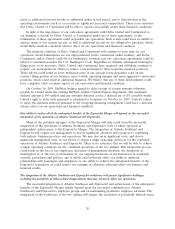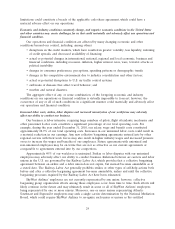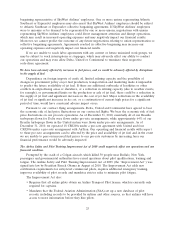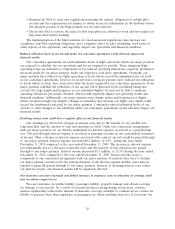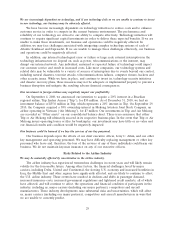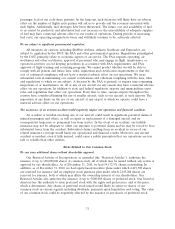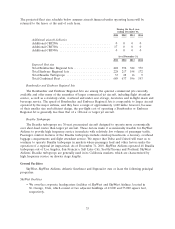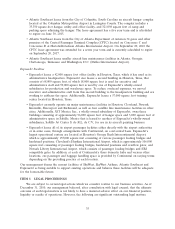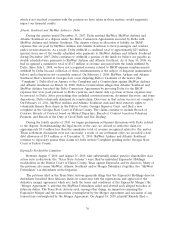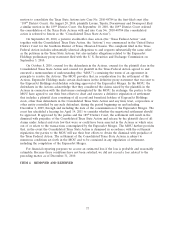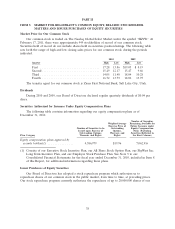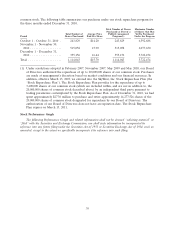SkyWest Airlines 2010 Annual Report Download - page 34
Download and view the complete annual report
Please find page 34 of the 2010 SkyWest Airlines annual report below. You can navigate through the pages in the report by either clicking on the pages listed below, or by using the keyword search tool below to find specific information within the annual report.The airline industry is highly competitive and has undergone a period of consolidation and transition leaving
fewer potential code-share partners.
The airline industry is highly competitive. We not only compete with other regional airlines, some
of which are owned by or operated as code-share partners of major airlines, but we also face
competition from low-cost carriers and major airlines on many of our routes. Low-cost carriers such as
Southwest, JetBlue, US Airways and Frontier among others, operate at many of our hubs, resulting in
significant price competition. Additionally, a large number of other carriers operate at our hubs,
creating intense competition. Certain of our competitors are larger and have significantly greater
financial and other resources than we do. Moreover, federal deregulation of the industry allows
competitors to rapidly enter our markets and to quickly discount and restructure fares. The airline
industry is particularly susceptible to price discounting because airlines incur only nominal costs to
provide service to passengers occupying otherwise unsold seats. Increased fare competition could
adversely affect our operations and the price of our common stock. The airline industry has undergone
substantial consolidation, and it may in the future undergo additional consolidation. Recent examples
include the merger between United and Continental in October 2010, Delta and Northwest
Airlines, Inc. (‘‘Northwest’’) in November 2008 and America West Airlines and US Airways in
September 2005, as well as the announced merger of Southwest and AirTran. We understand that
several airlines are currently in discussions related to consolidation in the industry. Other developments
include domestic and international code-share alliances between major carriers. Any additional
consolidation or significant alliance activity within the airline industry could limit the number of
potential partners with whom we could enter into code-share relationships and could have a material
adverse effect on our relationships with our code-share partners.
As a result of industry consolidations, one or more major airlines may change their strategy
regarding the use of their wholly-owned regional carriers and the use of third party regional carriers
such as SkyWest Airlines, Atlantic Southeast and ExpressJet. The major airlines may also make other
strategic changes such as changing or consolidating hub locations. If our major partners were to make
changes such as these in their strategy and operations, our operations and financial results could be
adversely impacted.
Terrorist activities or warnings have dramatically impacted the airline industry, and will likely continue to do
so.
The terrorist attacks of September 11, 2001 and their aftermath have negatively impacted the
airline industry in general, including our operations. The primary effects experienced by the airline
industry include a substantial loss of passenger traffic and revenue. Although, to some degree, airline
passenger traffic and revenue have recovered since the September 11th attacks, additional terrorist
attacks could have a similar or even more pronounced effect. Even if additional terrorist attacks are
not launched against the airline industry, there will be lasting consequences of the attacks, including
increased security and insurance costs, increased concerns about future terrorist attacks, increased
government regulation and airport delays due to heightened security. Additional terrorist attacks and
the fear of such attacks could negatively impact the airline industry, and result in further decreased
passenger traffic and yields, increased flight delays or cancellations associated with new government
mandates, as well as increased security, fuel and other costs. We cannot provide any assurance that
these events will not harm the airline industry generally or our operations or financial condition in
particular.
Fuel costs have adversely affected, and will likely continue to adversely affect, the operations and financial
performance of the airline industry.
The price of aircraft fuel is unpredictable and was volatile during much of 2008 and 2009 and, to a
lesser degree, 2010. Higher fuel prices may lead to higher airfares, which would tend to decrease the
30


